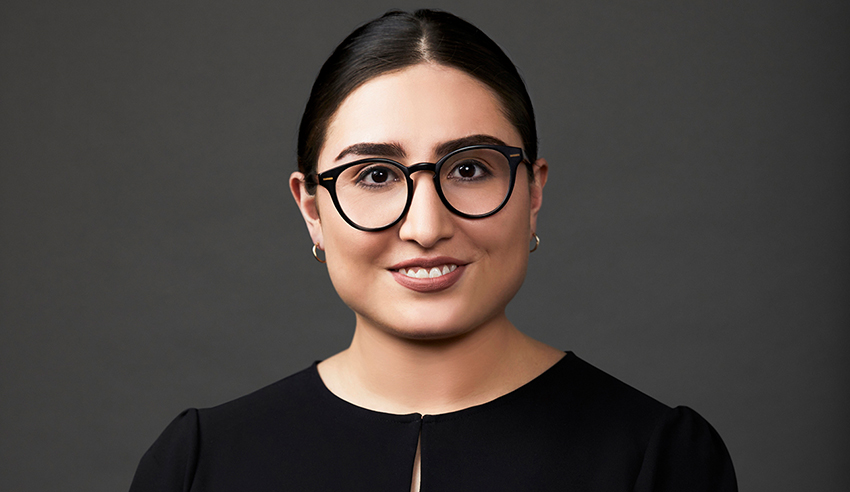Despite not getting into a role she originally wanted, this lawyer was able to throw herself into extracurriculars and come up with a Plan B – and said it’s something all young lawyers should be doing.

Olivia Irvine is a lawyer at Hazelbrook Legal, as well as a two-time winner of the Golden Gavel Competition in NSW – a comedic public speaking competition. Speaking recently on The Protégé Podcast, Ms Irvine emphasised the importance of challenging the preconceptions about yourself, particularly as a young lawyer.
“One of the hardest things to face as an early career lawyer is things not lining up the way that you think that they will. So, I graduated and then went to college of law, and I was admitted during COVID, so I had to have a virtual admission. And I had been doing my PLT with a community legal centre and I found that work to be very challenging, but ultimately, something that I really loved and that I cared about,” she said.
“And after a while of waiting around and applying for things as they came up, it became clear to me that that wasn’t something that I could do because basically, I had to support myself in this volunteer position, as well as working as a bookseller, and that wasn’t something which was sustainable. And I had to sit down and think, okay, well, what’s Plan B?”
Coming up with a Plan B can be especially difficult for students, Ms Irvine added.
“I think it also tends to feel, or you can feel as though it’s snowballing. So, it’s not just this one failure; it’s like every rejection that you receive afterwards can be traced back to this one thing, which is that I didn’t have legal experience. And I think that that is something which we really should look at for law students because I think that law students, particularly when I was in law school and I think it’s changing a little bit, are really shown a very clear pathway, and it’s a singular kind of pathway and it feels very scary to not see yourself on that pathway,” she explained.
“So, I think in terms of the journey to getting to a job that I really love, I did look at what I could do, what I could get my hands on. So, things like I was a submissions coordinator for the communications, entertainment and technology committee, which meant that over COVID, I think I did a then-record number of missions for that committee. That was later broken because COVID carried on, and through that, I actually did more and more with young lawyers so I did an administrative law moot. Before that, I did a commercial arbitration moot, and I think one of the challenges, even as I was doing those things, was looking at those things as part of a plan.”
As she started to involve herself in committees such as the NSW Young Lawyers and mentorship programs, Mr Irvine’s sense of self started to evolve and grow.
“As I started stepping up more in New South Wales Young Lawyers, I’m currently the chair of communications, entertainment, technology, and I am also the vice-president; and that’s an organisation that’s a subset of NSW Society and we’ve got about 15,000 people in NSW who are eligible to be part of that. So, I think stepping into those roles, you get people who are excited to hear from you, who think that what you’ve accomplished is really incredible and great. And I think that that’s a little bit hard to reconcile as well because you’re on the inside of that, which is seeing all of the things that you didn’t get, that you didn’t make,” she said.
“But on the other side of that coin, I think that you’re also able to look at all of the work that you have put into that. I think there’s this feeling that success is better if you don’t have to work at it and that it’s just something that has happened to you, and I think it’s not necessarily a thing that is a useful narrative, especially for law students, because I think that there’s this sense that if you don’t get it right away, that you’re bad or it’s not something you’re ever going to be good at, and that just isn’t true.”
The transcript of this podcast episode was slightly edited for publishing purposes. To listen to the full conversation with Olivia Irvine, click below:

Lauren is the commercial content writer within Momentum Media’s professional services suite, including Lawyers Weekly, Accountants Daily and HR Leader, focusing primarily on commercial and client content, features and ebooks. Prior to joining Lawyers Weekly, she worked as a trade journalist for media and travel industry publications. Born in England, Lauren enjoys trying new bars and restaurants, attending music festivals and travelling.